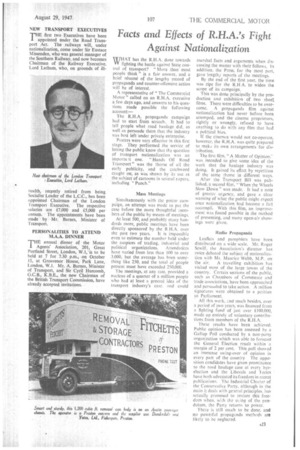Facts and Effects of R.H.A.'s Fight Against Nationalization WHAT has
Page 25

If you've noticed an error in this article please click here to report it so we can fix it.
the R.H.A. done towards VV fighting the battle against State control of transport? "More than most people think " is a fair answer, and a brief résumé of the lengthy record of propaganda and counter-offensive action will he of interest.
A representative of " The Commercial Motor" called on an R.H.A. executive a few days ago, and answers to his questions made possible the following account:— The R.H.A. propaganda campaign had to start from scratch. It had to tell people What road haulage did, as well as persuade them that the industry was best left 'under private enterprise.
Posters were very effective in this first stage. They performed the service of letting the public know that the question of transport nationalization was an importalt one. "Hands Off Road Transport" was the theme of all the early publicity, and the catchword caught on, as was shown by its use as the subject' of cartoons in several papers,
• including "Punch.'
Mass Meetings
Simultaneously with the poter earn-. paign, an attempt was made to put the case before the more thoughtful members of the public by means of meetings.
At least 500, and probably many hundreds more, public meetings have been directly sponsored by the R.H.A. over the past two years. It is impossible even to estimate the number held under the auspices of trading, industrial and political organizations. Attendances have varied from less than 100 to over 3,000, but the average has been something like 250, and the total of people present must have exceeded 250,000.
The meetings, at any rate, provided a nucleus of a quarter of a million people who had at least a general idea of the transport industry's case. and could
marshal facts and arguments when discussing the matter with their fellows. In addition, the Press, for the most part, gave lengthy reports of the meetings.
By the end of the first year, the time was ripe for the -R.H.A. to widen the scope of its campaign.
This was done principally by the production and exhibition of two short films. There were difficulties to be overcome. A propaganda film against nationalization had never before been attemped. and the cinema proprietors, rightly or wrongly, refused to have anything to do with any film that had a political bias.
If the cinemas would not co-operate, however, the R.H.A. was quite prepared to make its own arrangements for distribution.
The first film, "A Matter of Opinion,was intended to give some idea of the work that the haulage industry was doing. It gained its effect by repetition of the same theme in different ways.
After the Transport Bill was published, a second film, "When the Wheels Slow town " was made. It had a note of greater urgency, and gave a clear warning of what the public might expect once nationalization had become a fait accompli. With this film, an improvement was found possible in the method of presenting, and many open-air showings were given.
Radio Propaganda
Leaflets and pamphlets have been distributed on a wide scale. Mr. Roger Sewill, the Association's director has twice debated the subject of nationalization with Mr. Maurice Webb. M.P.: on the air. A travelling exhibition has visited most of the large towns of the country. Certain sections of the public, such as Chambers of Commerce and trade associations, have been approached and persuaded to take action. A million signatures were obtained to a petitiopt to Parliament.
All this work, and much besides, over a period of two years. was financed from a fighting fund of just over £100.000, made up entirely of voluntary contributions from members of the R.H.A.
These results have been achieved. Public opinion has been assessed by a Gallup Poll conducted by a non-party organization which was able to forecast the General Election result within a margin of 2 per cent. This poll showed an immense swing-over of opinion in every part of the country The opposition candidates have given prominence to the road haulage case at every byeelection and the Liberals and Tories have both advocated its freedom in recent publications. The Industrial Charter of the Conservative Party, although in the main it deals with general principles, has ;actually promised to restore this freedom when, wilh the swing of the pendulum, the Party returns to power.
There is still much to be done, and no powerful propaganda methods are likely to be neglected.












































































